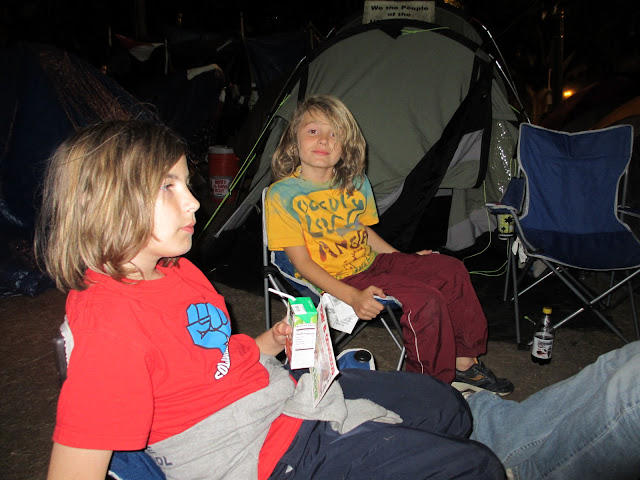The main event of every evening at Occupy LA is the general assembly meeting, and we didn’t want to miss it so we hustled the kids with their t-shirts back to the tent for some dinner. That’s where we were planning to meet our friends who had brought their son for the overnight as well. Striding down the sidewalk, past the humpy landscape of canvas abodes, I congratulated myself for turning a civics lesson into a fun sleepover as well. Of course, looking around, I was reminded that I wasn’t the first person to think of it.
As we waited for the big meeting and our friends, Pat and I talked to the kids about why we were spending the night there. They had certainly heard talk about the 99% from the radio shows we listened to. We had also talked to them about the financial crisis and the fact that the two parties governing our nation had widely disparate views on how to solve it.
Sitting on canvas chairs in front of our tent, we attempted to give this particular action a context that they could understand.
“So, because the two parties can’t agree, they can’t get anything done about the financial crisis,” Pat said, ripping off a hunk of French bread I had bought especially for that evening. Even though we were at a bare-bones populist action, there was no reason to eat like it.
“So that’s why we’re here? Because the government can’t fix it?” asked Spencer, sipping on his box of chocolate milk. I know what contributes to a successful sleepover.
“Well, we think that the government can fix a lot of things. Like a plumber fixes the toilet. Daddy and I can’t fix the toilet. That’s why we need a plumber.”
Pat and the boys stared blankly at me. Why, I wondered? The metaphor was solid.
Pat leaned forward to catch the boys’ attention, “Don’t think about the plumber. What mom is saying is that we believe that there are some things the government should handle and that’s one of the reasons we’re here. When the government isn’t paying attention to what the people want, the people have to get their attention in creative ways.”
Pat tends to have more confidence in the children’s ability to grasp big concepts than I do, and I probably lowball their ability to comprehend because my own is a bit shaky. But as we heard the noise of folks gathering on the other side of the building, Pat and I persisted in telling the kids about taxation, privatization, unnecessary wars, entitlements, and social safety nets.
“And what’s happening now,” Pat said, “is that money being taken away from the poor and the middle class; from our schools and from agencies that protect our environment because the banks and corporations don’t think it’s important to pay their fair share of taxes.”
“And,” I piped in, “because some people think that paying for wars is more important than helping to create jobs so we can feed our families.” I threw a look to Pat. Better than the plumber?
“That’s not fair,” said Spencer.
Bingo, I thought. If he hadn’t understood the specifics, at least he had grasped the inequities.
“What do you think, Murphy?” I turned to my baby. At seven, Murphy already has a sharp mind and a sophisticated sense of empathy.
“Can I play with Daddy’s phone?” he replied.
“No” Pat and I both replied in unison.
Fortunately, our friends arrived so the phone became a non-issue. The boys happily engaged their pal and we poured his parents a cup of wine, offered them some cheese, and leaned back in our chairs to look at the sky.
By seven-thirty it was totally dark and we walked over the General Assembly. About two-hundred people had gathered. They sat on the ground or stood at the back in groups listening to committee leaders who stood on the steps, talking through a microphone. Speakers went through housekeeping issues, security concerns, and the all important hand gestures that occupiers would use to vote on pretty much everything. The kids flopped around, enjoying the hand-gestures, particularly the one for “I don’t understand” – a circular motion in front of the face like you’re washing a window. I foresaw months of the kids using this gesture whenever I asked them to clean their room.
Much of the rest of the meeting was spent connecting Los Angeles to other occupy movements nationwide. We voted on sending money to Oakland and a bus of occupiers to San Diego. Organizers also took some time announcing specific upcoming marches and actions. The boys would watch for a while, then chase each other around.
Later, as I lay in our tent, I wondered what my sons would take away from this venture. Certainly, I hoped that they grasped some of the deep concerns that were propelling people – citizens -- to camp in the middle of our city. But more than that, I hoped that they felt connected those citizens. I didn’t want them to grow up thinking that it was someone else’s job to fix things.
And, in the end, if none of those messages had sunk in – even if Spence and Murph had been more preoccupied with the tent and their friend – I hoped that the cumulative effect of attending marches and rallies would start to make participation a habit. As I told them when I tucked them into their sleeping bags that night, “The first and most important thing you can do is to show up.”
It turns out that this is as true for peaceful revolution as it is for getting free donuts.
 |
| The boyz listen to Pat's explanation of why we were there |
 |
| At the General Assembly |
 |
| Sending messages of support to Oakland |
 |
| Waking up in the tent the next morning |



